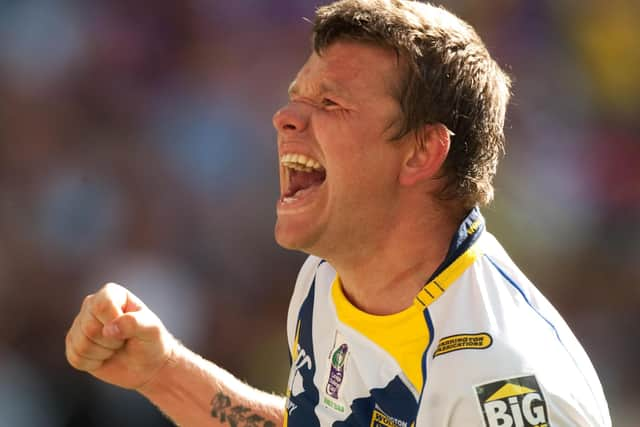Hull FC’s Marc Sneyd is simply world-class says record holder Lee Briers


Scrum-half Sneyd has 34 drop goals in the competition after his latest trademark cool-headed effort secured Friday’s 27-26 Golden Point win at Wakefield Trinity.
The week before, his one-pointer against Catalans Dragons took him clear of Wakefield’s Danny Brough and former England international Matty Smith who both presently sit on 32 while Leeds Rhinos legend Kevin Sinfield finished on 31.
Advertisement
Hide AdAdvertisement
Hide AdHowever, former Warrington Wolves star Briers, staggeringly, kicked 70 Super League field goals during his illustrious career before retiring in 2013.


It seems like a record that may never be broken.
Briers, of course, is currently assistant coach at Warrington who visit Hull on Thursday and he is certainly a fan of 29-year-old Sneyd’s style.
“Marc Sneyd is a world-class field goal expert,” he told The Yorkshire Post.
“Absolute world class. He has dug them out of so much trouble.


Advertisement
Hide AdAdvertisement
Hide Ad“But that’s what we get paid for. We get paid to do that. And that’s what you’re looking for in a player. It’s like Blake Austin here; he missed one for us at the weekend but he wanted the next one.
“It takes courage. It really does. And Marc Sneyd’s the same over at Hull.”
Ironically, Australian stand-off Austin, the Great Britain tourist, also slotted a drop-goal on the same night as Sneyd although his effort to help beat Castleford Tigers 9-8 was in normal time.
But what are the processes and training aspects a player must go through to become so accustomed to such a crucial role?


There are few better people to ask than Briers.
“There’s two types of field goals,” he said.
Advertisement
Hide AdAdvertisement
Hide Ad“One where you put yourselves three scores up. I used to look at the time and, with about 15 minutes to go, if we were two scores ahead, I’d hit a drop goal and there’s no pressure on you.
“They were the easy ones but still planned. You could do it when you’re 18 points up to take it to four scores, too.
“But then there’s the other ones where it’s going down to the last couple of minutes and the scores are level.
“You know for a fact they’re going to be after you. Your opponents.
Advertisement
Hide AdAdvertisement
Hide Ad“Then it comes not only down to the person kicking the drop goal but the person playing the ball, too. He has to play it quick so you have to organise that to get someone in you know will play the ball quick.
“Then you have to get in the right position to make sure the dummy half knows where you are and then the dummy half has to nail you with the pass as pressure will come from everywhere.
“So there’s a couple of ways of doing it and ways to practice. And you do have to practice it, practice it and practice as it is an art.
“You practice yourself and probably do a couple of sets in training just keeping on top of it.”
Advertisement
Hide AdAdvertisement
Hide AdBriers’ own practice dated back to the age of just four when he would take himself off to kick a ball wherever he could.
“I always used to tell myself ‘this is the one to win the Challenge Cup’,” explained Briers who played more than 400 games for Wolves and was one of the most gifted players of his generation.
“Every little spare piece of grass I’d use. And where I used to live at my mum and dad’s was a cul-de-sac. I used to practice kicking between lamp posts over an imaginary crossbar.
“I’m sure the neighbours were sick of me hitting their cars!”
Advertisement
Hide AdAdvertisement
Hide AdBriers, 41, believes there needs to be a rule change to help kickers in the modern game.
“I was quite lucky in that when I played there was no pressure if I missed as there was no seven-tackle sets like now,” said the former Wales international.
“That’s a rubbish rule; kicking a field goal is an art form, it takes proper courage to do and it’s being hampered now as if you miss you get seven tackles against you.
“Seven-tackle sets didn’t come in for that reason. They came in to stop teams kicking the ball dead in general play. I think we need to change the rule so you don’t concede one if you miss.”
Advertisement
Hide AdAdvertisement
Hide AdBriers also holds the record for most drop-goals in a Super League game having slotted five at Halifax in 2002 only to lose 16-11 following a last-minute try.
It is a bizarre feat but he recalled: “I’ll tell you exactly why I ended up scoring five field-goals; we were rubbish and couldn’t score any tries!
“I get embarrassed by those five drop-goals. It’s in the record books but I shouldn’t be kicking that many in a game.
“It doesn’t look good for a half-back if his side can’t score tries.
Advertisement
Hide AdAdvertisement
Hide Ad“But I suppose why I dropped so many field goals in my career is because my dad – who’s 85 now – lived in the era of Alex Murphy and players like that.
“There was an old saying about never leave the opposition 20 without a point and I’d had that ingrained in me. So I blame him!
“But I loved the pressure of it all. I thrived on that.”
Comment Guidelines
National World encourages reader discussion on our stories. User feedback, insights and back-and-forth exchanges add a rich layer of context to reporting. Please review our Community Guidelines before commenting.